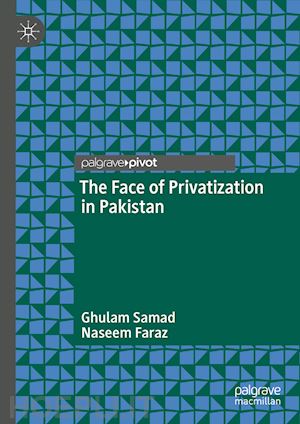
Questo prodotto usufruisce delle SPEDIZIONI GRATIS
selezionando l'opzione Corriere Veloce in fase di ordine.
Pagabile anche con Carta della cultura giovani e del merito, 18App Bonus Cultura e Carta del Docente
This book on privatization in Pakistan stands out due to its comprehensive and multifaceted approach towards examining the process, impact, and implications of privatizing state-owned enterprises (SOEs). The book provides an in-depth discussion on privatization in Pakistan which revolves around the historical context, contemporary challenges, and opportunities. It mainly covers the discussion on the rationale behind privatization, evolution of privatization policies, case studies of major privatizations, legal frameworks, and the role of public-private partnerships (PPPs). Along with exploratory analysis, this book also includes the first detailed empirical analysis and case studies to provide evidence-based insights into the performance and efficiency of privatized SOEs. Through exploratory and empirical analysis, and examination of key privatization cases, readers gain valuable insights into the real-world outcomes of privatization efforts in Pakistan. This book will be of interest to scholars of Asian economics, development economics and the future of the Eurasian region.
Chapter 1: Introduction.- Chapter 2: Privatization Trends.- Chapter 3: Current State Of State-Owned Enterprises In Pakistan.- Chapter 4: Chapter 4: Exploratory Analysis Of Privatization.- Chapter 5: Pre And Post Privatization Performance Of Soes: An Empirical Analysis.- Chapter 6: Power Sector: A Case Study Of K-Electric.- Chapter 7: Cement Industry: Case Study Of Maple Leaf Cement, Kohat Cement, And D.G. Cement.- Chapter 8: Telecom Sector: Case Study Of Pakistan Telecommunication Company Limited (Ptcl).- Chapter 9: Financial Sector: Case Studies Of Allied Bank Limited And Habib Bank Limited.- Chapter 10: State-Owned Enterprises (Governance And Operations) Act, 2023.- Chapter 11: Legal Framework of Privatization.- Chapter 12: Public Private Partnerships: Whether a Viable Solution for Pakistan?.- Chapter 13: Political Economy of Privatization.
Dr. Ghulam Samad is a Chief of Research Division at the Central Asia Regional Economic Cooperation (CAREC) Institute, ADB. Before joining CAREC Institute, Dr. Samad was a Senior Research Economist at the Pakistan Institute of Development Economics (PIDE), Ministry of Planning, Development and Special Initiatives. Dr. Samad also served as an Economist at the Planning Commission of Pakistan. Dr. Samad holds a Ph.D. in Economics from Colorado State University, USA.
Dr. Naseem Faraz is the Deputy Economic Adviser at the Economic Adviser's Wing, Ministry of Finance, Government of Pakistan. Dr. Faraz has also served as Revenue Forecasting Specialist at the Federal Board of Revenue. She has gained a long research experience as a Senior Research Economist at the Pakistan Institute of Development Economics (PIDE), Ministry of Planning, Development, and Special Initiatives. Dr. Faraz hold Ph.D. Economics from Clark University in Massachusetts, USA, with prestigious Fulbright Scholarship, MPhil, and MSc in Economics from Quaid-i-Azam University, Islamabad.











Il sito utilizza cookie ed altri strumenti di tracciamento che raccolgono informazioni dal dispositivo dell’utente. Oltre ai cookie tecnici ed analitici aggregati, strettamente necessari per il funzionamento di questo sito web, previo consenso dell’utente possono essere installati cookie di profilazione e marketing e cookie dei social media. Cliccando su “Accetto tutti i cookie” saranno attivate tutte le categorie di cookie. Per accettare solo deterninate categorie di cookie, cliccare invece su “Impostazioni cookie”. Chiudendo il banner o continuando a navigare saranno installati solo cookie tecnici. Per maggiori dettagli, consultare la Cookie Policy.